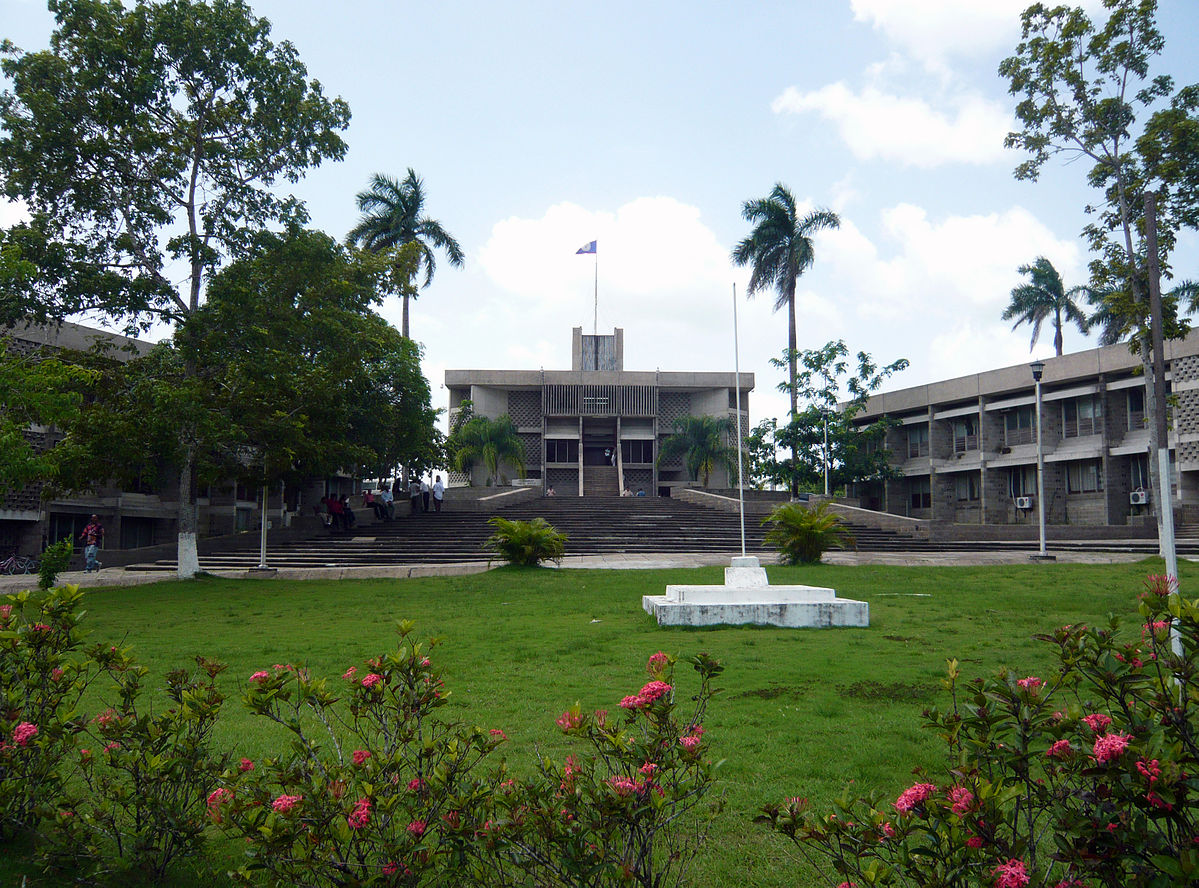
Belize’s National Assembly building. Photo credit: Wikimedia/Haakon S. Krohn (CC BY-SA 3.0)
KEY FACTS
Freedom House Rating
Free
Government Type
Parliamentary Democracy under a Constitutional Monarchy; a Commonwealth realm
Population
399,600 |
UPCOMING ELECTIONS
Parliamentary Elections
November 11, 2020
Village Elections
June-July 2024 (due) |
PAST ELECTIONS
Village Elections
June-July 2019
Parliamentary Elections
November 4, 2015 |
Belize is scheduled to hold parliamentary elections on November 11, 2020. Voters will elect all 31 members of the House of Representatives, the lower house of the bicameral National Assembly (the Governor General appoints the upper house).
The House then chooses the prime minister, who is the head of government and exercises most executive power. Meanwhile, the governor general (appointed by the British monarch) is the head of state, but plays a largely ceremonial role.
Political Context
Belize has two main political parties: Prime Minister Dean Barrow’s center-right United Democratic Party (UDP), which has been in government since 2008, and the center-left People’s United Party (PUP), which played a major role in negotiating Belize’s independence and dominated politics until the 1980s.
The upcoming elections are taking place in the context of an economic crisis brought on by COVID-19, which has hit Belize’s tourism-heavy economy particularly hard. Additionally, a series of scandals involving UDP could further hurt its chances to win re-election.
Geopolitical Context
Belize has an unresolved territorial dispute with neighboring Guatemala that goes all the way back to the 17th century. Guatemala claims most of the southern part of Belize. In 2008, the two governments agreed to take the matter to the International Court of Justice (ICJ) in The Hague in order to reach a resolution. Guatemalans passed a referendum affirming this plan by 95 percent.
However, in Belize, the matter proved controversial. In 2019, Belizeans finally held a referendum, and did vote in favor of going to the ICJ, with 55.4 percent in favor. Due to COVID-19, proceedings are delayed, and the matter remains in process.
Curated News and Analysis
Robert Looney, World Politics Review (October 16, 2020): In Belize, Corruption and COVID-19 Imperil the Ruling Party’s Reelection Hopes
Victor Bulmer-Thomas, London School of Economics (April 18, 2019): Belize’s referendum on its territorial dispute with Guatemala could finally bring an end to Central America’s most enduring conflict
21votes does not necessarily agree with all of the opinions expressed in the linked articles; rather, our goal is to curate a wide range of voices. Furthermore, none of the individuals or organizations referenced have reviewed 21votes’ content. That is to say, their inclusion should not be taken to imply that they endorse us in any way. More on our approach here.
Updated October 20, 2020
Related
Belize Parliamentary Elections: November 11, 2020
Leave a Comment
Last Updated: October 21, 2020 by 21votes
Belize’s National Assembly building. Photo credit: Wikimedia/Haakon S. Krohn (CC BY-SA 3.0)
Freedom House Rating
Free
Government Type
Parliamentary Democracy under a Constitutional Monarchy; a Commonwealth realm
Population
399,600
Parliamentary Elections
November 11, 2020
Village Elections
June-July 2024 (due)
Village Elections
June-July 2019
Parliamentary Elections
November 4, 2015
Belize is scheduled to hold parliamentary elections on November 11, 2020. Voters will elect all 31 members of the House of Representatives, the lower house of the bicameral National Assembly (the Governor General appoints the upper house).
The House then chooses the prime minister, who is the head of government and exercises most executive power. Meanwhile, the governor general (appointed by the British monarch) is the head of state, but plays a largely ceremonial role.
Political Context
Belize has two main political parties: Prime Minister Dean Barrow’s center-right United Democratic Party (UDP), which has been in government since 2008, and the center-left People’s United Party (PUP), which played a major role in negotiating Belize’s independence and dominated politics until the 1980s.
The upcoming elections are taking place in the context of an economic crisis brought on by COVID-19, which has hit Belize’s tourism-heavy economy particularly hard. Additionally, a series of scandals involving UDP could further hurt its chances to win re-election.
Geopolitical Context
Belize has an unresolved territorial dispute with neighboring Guatemala that goes all the way back to the 17th century. Guatemala claims most of the southern part of Belize. In 2008, the two governments agreed to take the matter to the International Court of Justice (ICJ) in The Hague in order to reach a resolution. Guatemalans passed a referendum affirming this plan by 95 percent.
However, in Belize, the matter proved controversial. In 2019, Belizeans finally held a referendum, and did vote in favor of going to the ICJ, with 55.4 percent in favor. Due to COVID-19, proceedings are delayed, and the matter remains in process.
Curated News and Analysis
Robert Looney, World Politics Review (October 16, 2020): In Belize, Corruption and COVID-19 Imperil the Ruling Party’s Reelection Hopes
Victor Bulmer-Thomas, London School of Economics (April 18, 2019): Belize’s referendum on its territorial dispute with Guatemala could finally bring an end to Central America’s most enduring conflict
21votes does not necessarily agree with all of the opinions expressed in the linked articles; rather, our goal is to curate a wide range of voices. Furthermore, none of the individuals or organizations referenced have reviewed 21votes’ content. That is to say, their inclusion should not be taken to imply that they endorse us in any way. More on our approach here.
Updated October 20, 2020
Share this:
Related
Category: Overview Tags: Belize